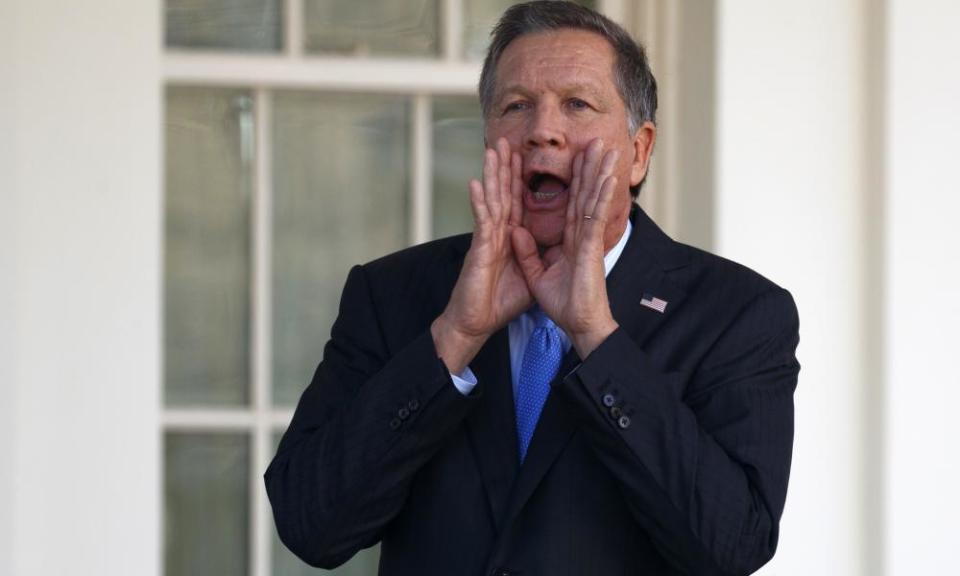'Out of bounds': Republicans criticize Trump over Joe Arpaio pardon
Ohio governor John Kasich is latest senior member of president’s own party to condemn pardon of former Maricopa County sheriff as politically motivated

The onslaught of criticism against Donald Trump’s decision to pardon former sheriff Joe Arpaio did not let up on Sunday, with members of the president’s own party calling the move “absolutely staggering”, “out of bounds” and a dangerous message to send to law enforcement.
“It absolutely should be out of bounds for somebody to use [the power to pardon] as some sort of a political wedge,” said Ohio governor John Kasich, who competed against Trump in the Republican primary in 2016 and is widely reported to be considering a run in 2020. “It appears as though that’s what it was.”
Arpaio gained infamy as the long-serving chief law enforcement officer of Maricopa County, which includes Phoenix, with a relentless and brutal campaign to detain undocumented immigrants. The sheriff’s use of chain gangs and prison tent cities during Arizona’s scorching summers, and scores of legal claims he violated the constitutional rights of Latinos, earned him a reputation on all sides as the nation’s most ruthless immigration opponent.
He lost a re-election bid in 2016 and was convicted this year of contempt of court, for refusing to carry out a court order stemming from a racial profiling case. Had the 85-year-old been sentenced, he would have faced up to six months in jail.
On Friday night, as national attention turned to Texas and Hurricane Harvey and hard right adviser Sebastian Gorka left the White House, Trump followed through on weeks of hinting that Arpaio would be pardoned.
Few national-level Republicans have been willing to defend the pardon. On Friday, both of Arizona’s senators, John McCain and Jeff Flake, criticized the president. On Saturday, as the Washington Post reported that Trump had asked attorney general Jeff Sessions if the case against Arpaio could be dropped, House speaker Paul Ryan issued a critical statement. The trend continued through Sunday morning.
“For the majority of Latinos, Joe Arpaio is a symbol of racism, of discrimination, of anti-Hispanic sentiment, or anti-immigrant sentiment, of abuse of power, and this is the guy Donald Trump chose to pardon,” said Ana Navarro, a Republican strategist who has frequently called on elected members of her party to oppose Trump.
Earlier in the weekend, Navarro called the pardon “a slap in the face to the Latino community”.
What differentiates the US from more repressive countries, she said on CNN’s State of the Union, is that “here, government officials are held accountable when they behave like thugs. The message that [Trump] is sending with this pardon to other government officials, to other law enforcement officials is a very bad message.”
Kasich, who has the power to pardon individuals convicted of state crimes, said he never wielded that ability before a person has made “proper restitution”.
“It’s not how I would have done it,” he told NBC’s Meet the Press.
The remark hinted at one of the distinctions between Trump’s pardon and those of his predecessor in the White House. Barack Obama overwhelmingly exercised his pardon authority for people, mainly nonviolent drug offenders, who had already served a large share of their sentences.
Trump’s few defenders nonetheless pointed to Obama’s pardons, commutations and acts of clemency, particularly the commutation of the sentence served by Oscar Lopez Rivera, a Puerto Rican activist who was convicted of seditious conspiracy, as justification for Trump’s action.
“What’s on display here is, frankly, the hypocrisy of the left,” said Steve Montenegro, an Arizona state senator called on to defend the president on CNN.
Calling the hundreds of low-level offenders who received Obama’s pardon “unrepentant thugs”, Montenegro drew a contrasting picture of Arpaio as an elderly man “who has served this country since he was 18”.
Michael Caputo, who was a communicatons adviser to Trump’s presidential campaign, similarly dismissed criticism.
“The people carping about this today are going to be carping about everything Donald Trump does,” he said on CNN.
Appearing opposite Montenegro, Jorge Ramos, the Spanish-language Univision news anchor who verbally scuffled with Trump during his racially charged campaign, said: “By pardoning Arpaio, President Trump is defending racism.”
Kasich waved away the notion that Congress should investigate Trump’s decision or force his testimony. Congress scrutinized presidents Gerald Ford and Bill Clinton for their decisions to pardon, respectively, president Richard Nixon and a wealthy Democratic donor, Marc Rich.
“We’ve got enough problems [without having] to start, you know, figuring out why he did this, OK?” Kasich said.
Danielle Pletka, senior vice-president for foreign and defense policy studies at the American Enterprise Institute, a conservative thinktank, suggested the pardon represented a breakdown in the rule of law.
“It is absolutely staggering that he chose to make this decision and chose to use the power of the presidency in this way,” she told NBC.
Describing what she believed to be the president’s logic, Pletka said: “Joe Arpaio is a guy who is deserves to be pardoned because he was good to Donald Trump. That’s the only standard that matters.”

